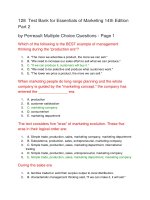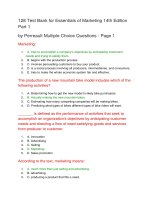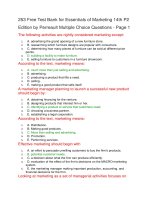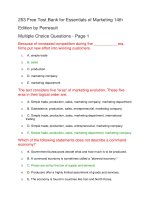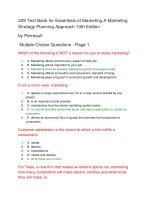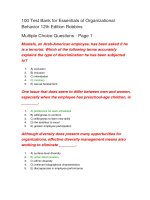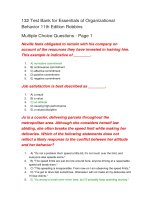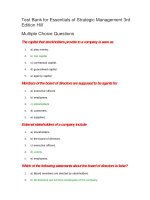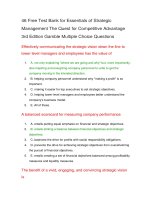Test bank for essentials of management information systems 8th edition laudon
Bạn đang xem bản rút gọn của tài liệu. Xem và tải ngay bản đầy đủ của tài liệu tại đây (112.13 KB, 22 trang )
Test Bank for Essentials of Management Information
Systems 8th Edition Laudon
Multiple Choice Questions
___________ support making decisions that are unique, rapidly changing,
and not easily specified in advance:
1.
a. Management information systems
2.
b. Transaction processing systems
3.
c. Executive support systems
4.
d. Decision-support systems
These systems are typically a major source of data for other systems:
1.
a. Transaction processing systems
2.
b. Management information systems
3.
c. Executive support systems
4.
d. Decision-support systems
A sales and marketing information system aids middle management in:
1.
a. tracking sales.
2.
b. planning new products and services.
3.
c. analyzing sales performance.
4.
d. preparing sales forecasts.
The term “management information systems” designates a specific
category of information systems serving:
1.
a. integrated data processing throughout the firm.
2.
b. transaction process reporting.
3.
c. employees with online access to historical records.
4.
d. middle management functions.
Employees that assist with paperwork at all levels of the firm are called:
1.
a. data workers.
2.
b. knowledge workers.
3.
c. operational management.
4.
d. service workers.
Equipment scheduling and facilities maintenance are functions of:
1.
a. finance and accounting systems.
2.
b. human resources systems.
3.
c. manufacturing and production systems.
4.
d. sales and marketing systems.
(Analysis) Which type of system would you use to determine the five
suppliers with the worst record in delivering goods on time?
1.
a. ESS
2.
b. TPS
3.
c. MIS
4.
d. DSS
A finance and accounting information system aids operational
management with:
1.
a. establishing long term investment goals.
2.
b. profit planning.
3.
c. accounts receivable.
4.
d. budgeting.
Senior management uses finance and accounting information systems to:
1.
a. plan long-term profits.
2.
b. decide where to locate new facilities.
3.
c. forecast sales trends.
4.
d. control the firms’ financial resources.
(Synthesis) Which type of information system would an intranet be most
easily adapted to?
1.
a. CRM
2.
b. MIS
3.
c. TPS
4.
d. KMS
A __________ is a senior manager who oversees the use of IT in the firm.
1.
a. CEO
2.
b. CFO
3.
c. CIO
4.
d. CIT
Development and support services for a firms’ business systems are
provided by:
1.
a. IT educational services.
2.
b. IT management services.
3.
c. Application software services.
4.
d. IT standards services.
A wiki is a type of:
1.
a. social networking site.
2.
b. blogging.
3.
c. video conferencing.
4.
d. Web site designed for collaborative writing and editing.
(Evaluate) You manage the Information Systems department at a small
startup Internet advertiser. You need to set up an inexpensive system that
allows customers to see real-time statistics such as views and clickthroughs about their current banner ads. Which type of system will most
efficiently provide a solution?
1.
a. CRM
2.
b. Enterprise system
3.
c. Extranet
4.
d. Intranet
Pricing analysis is an example of a:
1.
a. sales and marketing information system serving senior management.
2.
b. sales and marketing information system serving middle management.
3.
c. finance and accounting information system serving senior management.
4.
d. finance and accounting information system serving middle management.
Which of the following is a cross-functional business process?
1.
a. Hiring an employee
2.
b. Identifying a customer
3.
c. Fulfilling a customer order
4.
d. Creating an invoice
The three principal levels of hierarchies within a business organization
are:
1.
a. management, knowledge workers, and service workers.
2.
b. senior management, middle management, and operational management.
3.
c. management, data workers, and operational management.
4.
d. senior management, operational management, and workers.
Executive support systems are information systems that support the:
1.
a. long-range planning activities of senior management.
2.
b. knowledge and data workers in an organization.
3.
c. decision-making and administrative activities of middle managers.
4.
d. day-to-day processes of production.
(Evaluate) What is the most important benefit of an enterprise
application?
1.
a. Enabling speed of communicating.
2.
b. Enabling business functions and departments to share information.
3.
c. Enabling a company to work collaboratively with customers and suppliers.
4.
d. Enabling cost-effective, e-business processes.
These systems are especially suited to situations in which the procedure
for arriving at a solution may not be fully predefined in advance.
1.
a. Management information systems
2.
b. Transaction processing systems
3.
c. Decision-support systems
4.
d. Knowledge management systems
A sales and marketing information system aids operational management
in:
1.
a. tracking sales.
2.
b. planning new products and services.
3.
c. analyzing sales performance.
4.
d. preparing sales forecasts.
(Analysis) Which type of system would you use to determine what trends
in your supplier’s industry will affect your firm the most in five years?
1.
a. ESS
2.
b. TPS
3.
c. MIS
4.
d. DSS
Compensation analysis is an example of _________ information systems.
1.
a. finance and accounting
2.
b. enterprise application
3.
c. human resources
4.
d. sales and marketing
Promoting the organization’s products or services is a responsibility of
the _________ function.
1.
a. finance and accounting
2.
b. human resources
3.
c. manufacturing and production
4.
d. sales and marketing
(Analysis) Which type of system would you use to change a production
schedule if a key supplier was late in delivering goods?
1.
a. ESS
2.
b. TPS
3.
c. MIS
4.
d. DSS
Key actors in a business’s immediate environment include:
1.
a. regulations.
2.
b. technology.
3.
c. economy.
4.
d. politics.
Decision-support systems are also referred to as:
1.
a. business information systems.
2.
b. business intelligence systems.
3.
c. executive support systems.
4.
d. business model systems.
Interaction jobs are those jobs which:
1.
a. rely primarily on the use of collaborative information systems.
2.
b. involve knowledge that can't be put into an information system.
3.
c. are performed typically by operational-level employees.
4.
d. require intense levels of interaction with clients.
(Synthesis) You work for a highly successful advertiser that is just about
to expand nationally. Of utmost importance will be finding a way to store
and disseminate their client’s constantly updating branding and style
guides, which include multiple image files and text documents, to all of
their branches. What system will best serve these needs?
1.
a. An intranet with KMS capabilities
2.
b. An extranet with KMS capabilities
3.
c. A TPS with KMS capabilities
4.
d. A sales and marketing information system
Different firms can work collaboratively on product design, marketing, and
production using a(n):
1.
a. intranet.
2.
b. extranet.
3.
c. KMS.
4.
d. CRM.
_____________ systems often deliver information to senior executives
through a portal, which uses a Web interface to present integrated
personalized business content.
1.
a. Transaction processing
2.
b. Executive support
3.
c. Management information
4.
d. Decision-support
These systems are designed to summarize and report on the company’s
basic operations.
1.
a. Management information systems
2.
b. Decision-support systems
3.
c. Executive information systems
4.
d. Transaction processing systems
Policies that determine which information technology will be used, when,
and how are provided by:
1.
a. IT educational services.
2.
b. IT management services.
3.
c. Application software services.
4.
d. IT standards services.
(Analysis) Which type of system would you use to forecast the return on
investment if you used new suppliers with better delivery track records?
1.
a. ESS
2.
b. TPS
3.
c. MIS
4.
d. DSS
Market research is an activity associated with the _________ function.
1.
a. finance and accounting
2.
b. human resources
3.
c. manufacturing and production
4.
d. sales and marketing
These systems are designed to support organization-wide process
coordination and integration.
1.
a. Decision-support systems
2.
b. Management information systems
3.
c. CRM
4.
d. Enterprise applications
Budgeting is typically a feature of an information system serving:
1.
a. operational management.
2.
b. sales and marketing.
3.
c. senior management.
4.
d. middle management.
A computerized system that performs and records the daily dealings
necessary to conduct business is classified as a(n):
1.
a. executive support system.
2.
b. management-level system.
3.
c. decision support system.
4.
d. transaction-processing system.
Buying or selling goods over the Internet is called:
1.
a. e-commerce.
2.
b. e-business.
3.
c. an intranet.
4.
d. an extranet.
Management information systems support the:
1.
a. long-range planning activities of senior management.
2.
b. knowledge and data workers in an organization.
3.
c. administrative activities of middle managers.
4.
d. day-to-day processes of production.
ESS are specifically designed to serve the _______ level of the
organization:
1.
a. operational
2.
b. end-user
3.
c. middle management
4.
d. senior management
___________ systems provide information to coordinate all of the
business processes that deal with customers in sales, marketing, and
service to optimize revenue, customer satisfaction, and customer
retention.
1.
a. CRM
2.
b. MIS
3.
c. ESS
4.
d. CPS
(Analysis) A relocation control system that reports summaries on the total
moving, house-hunting, and home financing costs for employees in all
company divisions would fall into the category of:
1.
a. knowledge management systems.
2.
b. transaction support systems.
3.
c. executive-support systems.
4.
d. management information systems.
The use of digital technology and the Internet to execute the major
business processes in the enterprise is called:
1.
a. e-commerce.
2.
b. e-business.
3.
c. enterprise applications.
4.
d. MIS.
The five basic entities that make up any business are suppliers,
customers, employees, products and services, and:
1.
a. its environment.
2.
b. manufacturing and production.
3.
c. sales and marketing.
4.
d. invoices and payments.
(Synthesis) You have been hired by a non-profit agency to implement a
system to handle their donations. Event fund-raisers need to be able to
quickly access a donor’s information and history. The marketing
department needs to be able to create customized mailing lists, in order to
send different messages to different types of donors. What system(s) will
best meet these needs?
1.
a. TPS
2.
b. TPS with DSS
3.
c. TPS with MIS
4.
d. TPS with ESS
A(n) __________ collects data from various key business processes and
stores the data in a single comprehensive data repository, usable by other
parts of the business.
1.
a. transaction processing system
2.
b. enterprise system
3.
c. automatic reporting system
4.
d. management information system
The principal liaison between the information systems groups and the rest
of the organization is a(n):
1.
a. programmer.
2.
b. information systems manager.
3.
c. systems analyst.
4.
d. CIO.
____________ systems integrate and share information from supplier,
manufacturer, distributor, and customer logistics processes.
1.
a. Collaborative distribution
2.
b. Supply-chain management
3.
c. Reverse logistics
4.
d. Enterprise planning
True - False Questions
Deciding whether to introduce a new product line is the responsibility of
an operational manager.
1.
True
2.
False
Decision-support systems often use information from external sources.
1.
True
2.
False
(Analysis) Supply chain management systems are more externally
oriented than enterprise systems.
1.
True
2.
False
Most MISs use sophisticated mathematical models or statistical
techniques.
1.
True
2.
False
Senior management is responsible for directing the day-to-day activities
of the business.
1.
True
2.
False
Transaction processing systems are most commonly encountered at the
senior management level of an organization.
1.
True
2.
False
Management information systems primarily support nonroutine decision
making.
1.
True
2.
False
TPS help managers monitor the firm's relations with the external
environment.
1.
True
2.
False
Operational-level manufacturing systems deal with the firm’s long-term
manufacturing goals, such as where to locate a new plant.
1.
True
2.
False
Information supplied by an enterprise system is structured around crossfunctional business processes.
1.
True
2.
False
ESSs are designed to serve the middle management of the organization.
1.
True
2.
False
Transaction processing systems are the basic business systems that
serve the operational level of the organization.
1.
True
2.
False
ESSs are designed primarily to solve specific problems.
1.
True
2.
False
Decision-support systems help managers make decisions that are unique,
rapidly changing, and not easily specified in advance.
1.
True
2.
False
Enterprise systems typically do not include transactions with customers
and vendors.
1.
True
2.
False
Maintaining online directories of employees with special areas of
expertise is one application of knowledge management systems.
1.
True
2.
False
(Analysis) A hotel reservation system is a typical example of a
management information system.
1.
True
2.
False
ESSs are designed to incorporate data about external events, but they
also draw summarized information from internal MIS and DSS.
1.
True
2.
False
Cell phones today are a basic part of a firm’s telecommunications
infrastructure.
1.
True
2.
False
The decision to grant credit to a customer is normally made by a senior
manager.
1.
True
2.
False
19 Free Test Bank for Essentials of Management
Information Systems 8th Edition Laudon Free Text
Questions Online
________ are highly trained technical specialists who write the software
instructions for computers.
Answer Given
Programmers
A firm depends heavily on its___________ to supply capital, labor,
customers, new technology, services and products, stable markets and
legal systems, and general educational resources.
Answer Given
environment
A(n)____________ is used by middle management to combine data and
sophisticated analytical models or data analysis tools to support
semistructured and unstructured decision making.
Answer Given
decision-support system/DSS
A(n)_________ is a set of logically related activities for accomplishing a
specific business result.
Answer Given
business process
Define and discuss the use of cross-functional business processes within
a firm,
Answer Given
Cross-functional processes are those that require input, cooperation, or
coordination between the major business functions in an organization. For
instance, when a salesman takes an order, the major business functions of
planning, production, inventory control, shipping, accounting, and customer
relations will all be involved before the order is completed. What at first appears to
be a simple process, fulfilling an order, turns out to be a very complicated series of
business processes that require the close coordination of major functional groups
in a firm. Second, to efficiently perform all the steps in the order fulfillment process
requires a great deal of information and, in order to be efficient, the rapid flow of
information both within the firm (with business partners, such as delivery firms)
and with the customer.
How can a good CRM system increase profits for a company?
Answer Given
Customer relationship management uses information systems to coordinate all of
the business processes surrounding the firm’s interactions with its customers. The
systems consolidate customer information from multiple sources — telephone, email, wireless devices, traditional sales and marketing systems, and the Web —
so that the firm can obtain a unified view of a customer. Understanding the
customer allows a firm to increase the effectiveness of their marketing campaigns.
The_________ formula calculates the least expensive quantity to reorder
for restocking inventory.
Answer Given
“economic order quantity”
______ are representatives of departments outside of the information
systems group for whom applications are developed.
Answer Given
End users
Discuss the difference between the finance function and the accounting
function.
Answer Given
The finance function is responsible for managing the firm’s financial assets, such
as cash, stocks, bonds, and other investments, to maximize the return on these
financial assets. The finance function is also in charge of managing the
capitalization of the firm. To determine whether the firm is getting the best return
on its investments, the finance function must obtain a considerable amount of
information from sources external to the firm. The accounting function is
responsible for maintaining and managing the firm’s financial records – receipts,
disbursements, depreciation, and payroll – to account for the flow of funds in a
firm. The accounting function obtains information from sources internal to the firm.
Identify and discuss the major types of systems in a business from a
constituency perspective. What is the relationship between these
systems?
Answer Given
There are four major types of information systems in contemporary organizations:
Transaction processing systems, such as payroll or order processing, track the
flow of the daily routine transactions that are necessary to conduct business; 2)
Management information systems (MIS) provide the management control level
with reports and access to the organization’s current performance and historical
records. Most MIS reports condense information from TPS and are not highly
analytical; 3) Decision-support systems (DSS) support management decisions
when these decisions are unique, rapidly changing, and not specified easily in
advance. They use advanced analytical models and data analysis capabilities and
often draw on information from external as well as internal sources; 4) Executive
support systems (ESS) support senior management by providing data of greatest
importance to senior management decision makers. ESS provide a generalized
computing and communications capacity that can be applied to a changing array
of problems. ESS present graphs and data from many sources through an
interface that is easy for senior managers to use, often a portal. The various types
of systems in the organization exchange data with one another. TPS are a major
source of data for other systems. MIS summarize and report on the company’s
basic operations using data supplied by transaction processing systems. Although
DSS use internal information from TPS and MIS, they often bring in information
from external sources, such as current stock prices or product prices of
competitors. ESS are designed to incorporate data about external events, such as
new tax laws or competitors, but they also draw summarized information from
internal MIS and DSS.
(Evaluation) In your opinion, what are at least three factors that contribute
to the difficulty of integrating systems for different organizational levels
and functions within an organization? Support your answer.
Answer Given
An example answer is: Three factors that can contribute include different
computing environments; different data kept; and employee resistance. Different
computing environments can make it difficult in terms of programming to connect
the systems together. If the systems have kept different types of data and different
records, this may also be a hindrance. For example, if some elements in a
database are recorded differently, such as a customer ID not being the same in
one area as another, this would make consistency a problem and may contribute
to redundant information. There may also be resistance to adopting new,
integrative systems that are more efficient because these may change business
processes and the functions of employees. People working in an organization may
not want to lose the responsibilities they have and the functions they understand.
a
Describe the information systems supporting the major business
functions: sales and marketing, manufacturing and production, finance
and accounting, and human resources.
Answer Given
• Sales and marketing help the firm identify customers for the firm’s products or
services, develop products and services to meet customers’ needs, promote the
products and services, sell the products and services, and provide ongoing
customer support; • Manufacturing and production systems deal with the planning,
development, and production of products and services, and controlling the flow of
production; • Finance and accounting systems keep track of the firm’s financial
assets and fund flows; • Human resources systems maintain employee records;
track employee skills, job performance, and training; and support planning for
employee compensation and career development.
________ applications span the entire firm, integrating information from
multiple functions and business processes to enhance the performance of
the organization as a whole.
Answer Given
Enterprise
Managers need _________ systems to monitor the status of internal
operations and the firm’s relations with the external environment.
Answer Given
transaction processing
The retail home improvement chain you work for, DIY Discount, has
noticed that one of its brands of faucets is not selling nearly as well as
anticipated. What information systems of the business will you use to
determine the reason for the poor sales? Discuss what information you
will retrieve from which system. Which of the information systems will be
most important for your analysis? Which of the systems will be least
important?
Answer Given
You might query operational level manufacturing and production TPS to make
sure that the product is actually getting to the stores and being restocked. You
could query MIS to see average sales levels according to geography, location,
and other factors to see if there are any specific factors affecting the sales. You
might query marketing systems to see what was seen as the appeal of these
faucets and what if any promotions were used, and executive-level sales and
marketing systems to see what trends are predicted for faucets. You might query
human resource systems to make sure that there aren’t any incentive programs
that are diminishing the importance of the faucet sales. You might query ESS to
see if the same faucets are being sold by competitors and what these prices are.
You might use DSS to see what factors could increase sales. Assuming that the
faucets are being properly stocked at the stores, the most important systems to
query are the managerial-level systems: MIS for summaries of sales records to
help pinpoint any other factors, sales and marketing to assure that promotion and
pricing is accurate, ESS to check competition, and DSS for higher-level analysis to
forecast possible solutions. The least important to query would be finance and
accounting systems as these record data that shouldn’t be affecting the sales of a
faucet.
What is the connection between organizations, information systems, and
business processes?
Answer Given
Business processes refer to the manner in which work activities are organized,
coordinated, and focused to produce a specific business result. They also
represent unique ways in which organizations coordinate work, information, and
knowledge and the ways in which management chooses to coordinate work.
Managers need to pay attention to business processes because they determine
how well the organization can execute, and thus are a potential source for
strategic success or failures. Although each of the major business functions has
its own set of business processes, many other business processes are crossfunctional. Information systems can help organizations achieve great efficiencies
by automating parts of these processes or by helping organizations rethink and
streamline them. Firms can become more flexible and efficient by coordinating
and integrating their business processes to improve management of resources
and customer service.
Supply chain management systems are one type of_________ system
because they automate the flow of information across organizational
boundaries.
Answer Given
interorganizational
Describe at least two benefits of using enterprise systems.
Answer Given
Enterprise systems integrate the firm’s key business processes in sales,
production, finance, logistics, and human resources into a single software system
so that information can flow throughout the organization, improving coordination,
efficiency, and decision making. These systems help create a more uniform
organization in which everyone uses similar processes and information, and
measures their work in terms of organization-wide performance standards. The
coordination of the firm’s key business processes allows the firm to respond more
rapidly to customer demands.
The_________ function is responsible for attracting, developing, and
maintaining the firm’s workforce.
Answer Given
human resources
